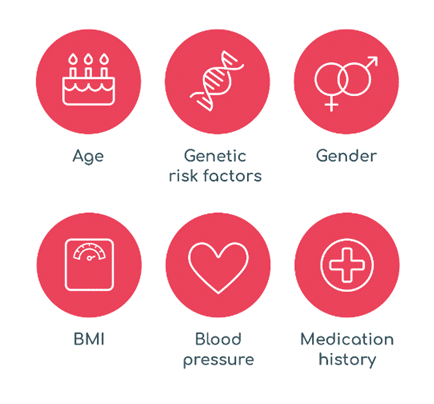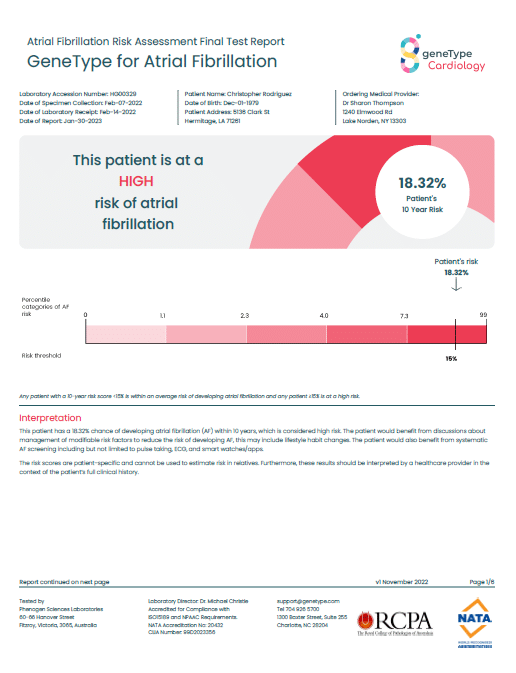Optimize the management of your patients at risk of atrial fibrillation
Afib can lead to stroke. Address your patients’ risk of afib proactively by knowing their risk.


An integrated risk assessment when you need it
GeneType for Atrial Fibrillation (AF) integrates clinical and genetic risk factors.
With this one test, geneType integrates clinical risk factors to deliver an improved view of your patient’s AF risk in a single risk score.
Don’t let hidden baseline risk go unnoticed
There are many strategies to proactively manage your patient’s risk of stroke. Understanding and managing your patients’ AF risk is one of them.
Be proactive with your patient and manage their risk before symptoms present.
With geneType, you can incorporate an additional risk factor, polygenic risk, that looks at underlying common genetic markers associated with AF.

Reveal your patient’s hidden baseline risk.
Let geneType help inform your decision-making discussions.
One report with clinically actionable insights
GeneType reports are structured to make the results easy to interpret and communicate to a patient.
The geneType for Atrial Fibrillation report includes:
- A snapshot of your patient’s 10-year risk score
- Interpretation of what their risk scores mean in the context of current guidelines
- Information about managing AF risk factors
- Types of screening and intervention strategies that may be relevant to their risk category.
Sample patient report

The geneType patient

Want to look beyond the obvious risk factors?
AF risk prediction models, like the Framingham, perform well in many adults. But some of your patients would benefit from the identification of the baseline risk that geneType can uncover.
GeneType allows you to integrate the standard clinical factors with your patient’s polygenic risk to deliver a single 10-year risk score.
GeneType testing is simple

Step 1
Register as a provider; our team will provide clinical education and other resources as needed.
geneType will send kits to your clinic to have on hand.

Step 2
Discuss geneType with your patient.
Would geneType help them qualify for additional risk reduction strategies?

Step 3
Complete the Test Requisition form, collect a sample from the patient in the buccal swabs provided and return both to geneType.
You will have the option to use a paper requisition, or a secure, compliant portal to complete the ordering process.

Step 4
Leave the rest to us.
geneType will notify you when your patient’s results are ready.
You will have the option to request a consult with a genetic counsellor, whether to review your patient’s results and/or to follow-up with your patient, as needed.
Do you have questions?
We have answers.
If your question is not shown here, please contact us directly.
Is this test reimbursed by insurance?
No. At this time geneType is a self-pay test. However, your patient may use FSA/HSA to pay for the test.
Does this test cover all the atrial fibrillation risk factors?
This test does not incorporate all possible risk factors for atrial fibrillation into the risk prediction model; however it incorporates the most significant. Test results should be interpreted in the context of the patient’s full clinical and family history.
Are there female-specific risk factors incorporated into this test?
No.
Even though there are certain coronary artery disease risk factors specific to women, like preeclampsia or gestational diabetes, these factors are not currently incorporated into the model. A woman’s age is incorporated into the model and indirectly accounts for post-menopausal changes associated with increased risk of developing coronary artery disease.
I already use a free clinical risk assessment model for atrial fibrillation, why should I use geneType instead?
The benefits of geneType are two-fold.
First, we incorporate a novel risk factor based on your patient’s underlying genetic markers. There is no other way to identify this baseline level of genetic risk outside of geneType.
Second, not only do we incorporate this genetic marker, but we combine it with other clinical risk factors and specifically calibrate the model to the general population. When we compare calibration with traditional clinical risk assessment, geneType is better calibrated, meaning it can provide more trustworthy risk prediction.
My patient already brought me another similar test and the results show they have a high polygenic risk of atrial fibrillation, should I ask my patient to retest with geneType?
Yes.
While there are direct-to-consumer companies out there that provide random lists of genetic markers that are associated with atrial fibrillation, there are no checks and balances associated with the results they provide. Most of the markers they pull from peer-reviewed publications without cross validating the markers. And more importantly, geneType goes through rigorous statistical validation of the genetic component prior to integrating it into the full model. The fully integrated geneType model is then validated separately.

*Patient eligibility dependent on personal medical history, age and sex
Interested in ordering more than one disease? Order geneType Multi-Test.
See individual disease pages for more information about each test.
The Multi-Risk suite of tests is for adults 40-85 years of age. At maximum, a woman would be eligible for 8 diseases in the panel; a man would be eligible for 7. Starting at age 30, a patient may qualify for geneType's cancer risk assessments only.
Are you ready to start with geneType?
The first step is to trial geneType at your practice.
Blog posts
GeneType Multi-Risk assessments tailored to your needs
It’s not always easy to know what questions to ask your Doctor. Here are some breast cancer risk questions…
Breast Cancer risk – Starting the conversation
It’s not always easy to know what questions to ask your Doctor. Here are some breast cancer risk questions…
Proactive steps for breast cancer risk reduction
Breast awareness is important whether you are 35 or 75. When you understand your risk, you can be a better advocate for yourself…
References
- Kahwati L, Asher GN, Kadro ZO, et al. Screening for Atrial Fibrillation: An Evidence Review for the U.S. Preventive Services Task Force [Internet]. Rockville (MD): Agency for Healthcare Research and Quality (US); 2022 Jan. (Evidence Synthesis, No. 208.) Available from: https://www.ncbi.nlm.nih.gov/books/NBK577975/
- Arnett DK et al. J Am Coll Cardiol 2019;74(10):1376–414.
Keep up-to-date with our latest advances
Sign up to our newsletter to stay informed about our latest advances and how these could support your practice.







